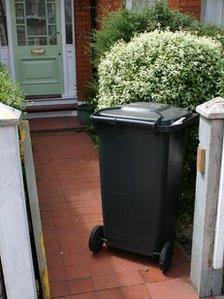Some big challenges lie ahead for Welsh local councils
- Published

Collecting rubbish is one of the services local councils provide
Elections for 21 of Wales' 22 local authorities take place on Thursday, with voting delayed for a year in Anglesey, whose council is being run by Welsh government-appointed commissioners.
But what will voters be choosing and what is the outlook for councils? Dr James Downe and Professor Steve Martin of Cardiff Business School give their assessment.
Q Why does Wales have 22 local councils?
A total of 22 unitary councils were introduced in 1996 because there was a desire to do away with a two-tier structure of counties and districts.
It was argued by some that basing the unitaries on the existing county councils would make them too remote from local communities. The result is councils that are bigger than the 37 old districts but smaller than the eight old counties. The councils vary in size from Merthyr Tydfil, with a population of about 56,000 people, to Cardiff, with 341,000.
Many people argue that it would be more efficient to have a smaller number of larger authorities. But others say that the research evidence doesn't support this because Welsh councils are larger than those in many other European countries and there doesn't seem to be a correlation between size and performance failure - some big councils have got into trouble and so have some small ones. Also, the cost and turmoil associated with reorganisation can outweigh any benefit.
Q What services are councils responsible for?
Local councils provide a wide range of services including education and social services (the two highest spending service areas), highways, transport, waste management, libraries, leisure, trading standards, environmental health and planning.
Q Where do they get their money from and how much do they spend?
Welsh local councils spend almost £7bn on their services each year. The large majority of this comes from the Welsh government (around 80%) with the remainder (20%) being made up from the council tax and charges
Q How will councils cope with austerity?
The harsh economic climate has significantly affected Welsh local government, but it has got off lightly compared to its English counterparts.
Councils have a choice: do less with less by making small cuts in services, especially non-statutory services, to balance the books; or do different things and do things differently, becoming more enabling and less focused on direct provision. This would mean finding ways to support communities and citizens to help themselves.
Q What are the challenges facing local government over the next five years?
There are significant challenges ahead for Welsh councils. They have to deal with cuts in public spending whilst maintaining service quality. Councils have to tackle the causes of educational under-attainment and deal with the increasing proportion of the population which are elderly.
Q How well are they collaborating?
The Welsh government is increasingly pushing local councils to work with other organisations to improve the way in which services are provided to better meet the needs of local communities.
Public service organisations need to become more efficient in service provision and collaborate with each other where it has the potential to lead to better outcomes.
Cardiff Business School has been conducting an <link> <caption>evaluation</caption> <url href="http://business.cardiff.ac.uk/cy/centre-local-and-regional-government-research-clrgr/research/public/learning" platform="highweb"/> </link> of how well councils are collaborating, the extent to which they are putting the citizen at the centre of policy and delivery and examining the relationship between local and central government.
- Published5 April 2012